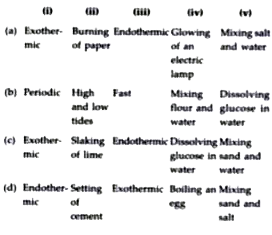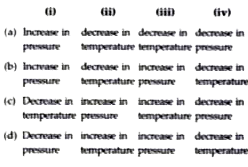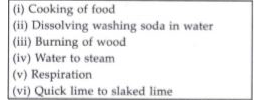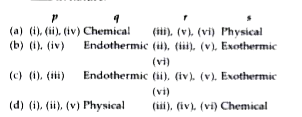Read the given passage and fill in the blanks by choosing an appropriate option. There are some changes in which heat from outside is absorbed leaving the surroundings cooler while in other changes heat is given out making the surroundings warmer. A change in which heat is given out is called a/an i______ change e.g., ii______ , while a change in which heat is taken in is called a/an iii______ change e.g., iv______ . There are many changes in which heat is neither given out nor taken in e.g., v______ .

The correct Answer is:C
A change in which heat is given out is called an exothermic change while a change in which heat is absorbed is called an endothermic change. Slaking of lime is an exothermic change while dissolution of glucose in water is an endothermic change. No heat change is observed when sand and water are mixed.
Similar Questions
Knowledge Check
A process in which no heat change takes place is called
AAn isothermal processBAn adiabatic processCAn isobaric processDAn isochoric processWhen heat is given to a gas in an isothermal change, the result will be
AExternal work doneBRise in temperatureCIncrease in internal energyDExternal work done and also rise in temp.If specific heat of a substance is infinite, it means a) heat is given out b) heat is taken in c) no change in temperature whether heat is taken in or given out d) all of these
Aheat is given outBheat is taken inCno change in temperature takes place whether heat is taken in a or given outDAll the above
Describe the changes which occur on heating sulphur
View SolutionRead the given passage and fill in the blanks by selecting an appropriate option.
Change in temperature and pressure plays a very important role in changing the state of matter. A gas gets liquefied with i______ and ii______ while camphor undergoes sublimation with iii______ and vi______

View SolutionWhat is the change in internal energy when 4 Kj of work is done on the system and 1 Kj of heat is given out.
View SolutionA few changes are listed in the given box.

Now, read the given passage and fill in the blanks by choosing an appropriate option. Processes p_____ involve consumption of heat energy and are q_____ in nature while processes r_____ involve evolution of heat energy and are s_____ in nature.

View SolutionExplain the change of heat energy in a physical change.
View Solution
